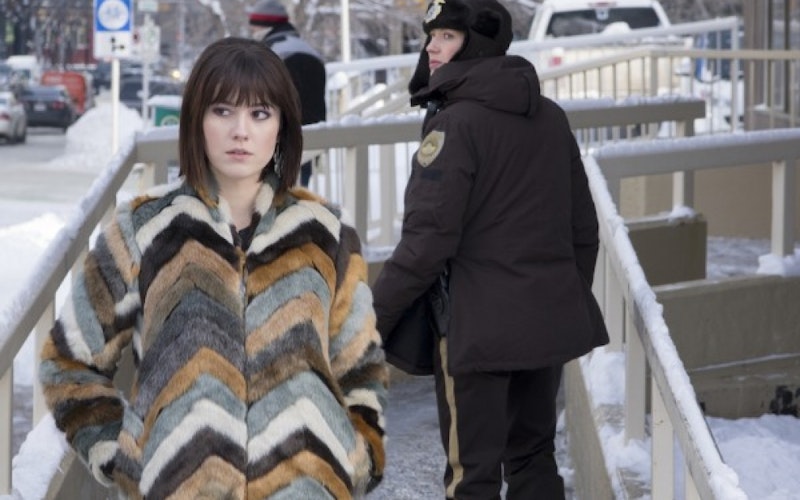
TV
Fargo: Seeking Harmony in the Face of Discord
Fargo, the FX anthology series inspired by the 1996 Coen brothers’ movie of the same name, is one of the most Christian shows on television today—not in the sense that it’s evangelical or apologetic, but in the manner that it offers a Christian way of looking at the world, and at evil in particular. As in the Westerns of old, Fargo bristles with cataclysmic clashes between good and evil, where nefarious villainy is met with indefatigable fortitude. Indeed, Fargo’s is a world in which evil is actually recognized as depravity and heroism, while perhaps not rewarded, is at least honored.
Season three of the series features Ewan McGregor and premieres Wednesday. The first two seasons have fundamentally been about courageous characters who clash with malevolent villains intent on tearing apart the harmony and tranquility of an otherwise peaceful place. In season one, deputy Molly Solverson (Allison Tolman) of Duluth, Minn., encounters drifter and con man Lorne Malvo (Billy Bob Thornton), whose inspired trickery convinces otherwise mild-mannered Lester Nygard (Martin Freeman) to do away with his oppressive wife. Malvo is an antagonist straight out of central casting, complete with a long, dark coat and a caustic grin. Solverson, meanwhile, is the opposite: a protagonist worth rooting for. She’s smart, thoughtful, imaginative, and steadfast—a sort of modern-day Will Kane. In season two, we see the mesmerizing story of Molly’s father, Lou (Patrick Wilson), who two decades before her own adventure challenged a darkness equally as heinous as the one his daughter would end up facing.
As one might expect from a show inspired by the work of Joel and Ethan Coen, Fargo is quirky and strange and highly stylized. It can be side-splittingly funny and bitterly heartbreaking at once. And it’s rich with the sort of provincial vernacular that has long defined the work of the Coens. But for all that, it never loses track of its center: the idea that the world is broken and imprisoned and full of discord and that good people must rail against its complete dissolution.
As Lou tells his cancer-stricken wife midway through season two, “We’re just out of balance ... the whole world ... used to know right from wrong ... a moral center ... now ...”
Lou carries within himself a deep-seated moral center—a desire for harmony.
He can’t bring himself to finish the thought. And who can blame him? Maybe there is no ending worth saying out loud. As one of Lou’s friends notes, things start small, maybe with a random act of ugliness, a relationship gone bad, a dream dashed. But so often these small things eventually turn into full-blown evil. “Just watch,” says Lou’s friend, “this thing’s only getting bigger.”
Yet Lou Solverson is no film-noir nihilist. He’s hopeful and carries within himself a deep-seated moral center—a desire for harmony—that drives his passion for justice and his search for peace. Whereas many other characters allow themselves to get swept up in the cancerous evils that haunt the story, Solverson is steadfast in his fidelity to the idea that there is a higher power in control. In fact, Lou (in season two) and Molly (in season one) stand out as protagonists worth rooting for largely because they resist the fleeting temptations that small evils can offer, small evils that turn into de-harmonizing cancers. Instead, these heroes remain hopeful that evil can be defeated. Sometimes evil will win, they know. But to stop pushing back is never an option.
In On the Incarnation, St. Athanasius describes sin as a disease that overcomes and corrupts the Christian’s soul. But he also offers a hopeful reminder worth contemplating in Easter’s afterglow: “For this purpose, then, the incorporeal and incorruptible and immaterial Word of God entered our world . . . he surrendered his body to death . . . that he might turn again to incorruption men who had turned back to corruption, and make them alive through death by the appropriation of his body and by the grace of his resurrection.”
Fargo doesn’t tell us whether the Solversons would accept this bit of Christian orthodoxy. But it doesn’t much matter, because in the end their stories take place in a world where the corruption of evil men (and the suffering of cancer patients) is recognized for what it is: disharmony and dissonance. What’s more, Fargo recognizes that that’s not the end of the story. After all, one truly good Father can sometimes raise up a truly heroic daughter. In that, it’s the perfect show to watch in the wake of Easter.
Topics: TV